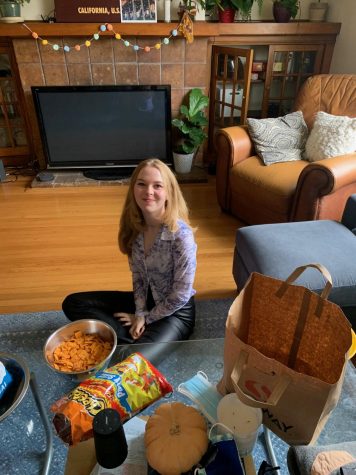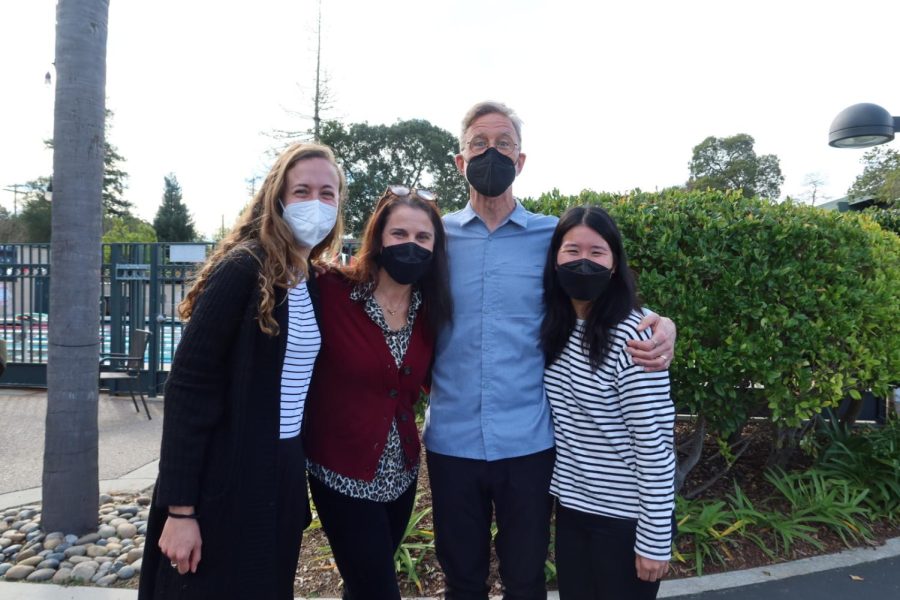Faculty on young love: Learning from their mistakes
Teachers pose for a group photo (From left to right: Ms. Hansen, Ms. Pence, Mr. Quinton, Ms. Loui).
Believe it or not, all members of the Castilleja faculty were young once, too. They endured similar tribulations of teenage life, which might even include love-related endeavors. However, these past romantic encounters provide Castilleja teachers ample wisdom to answer the essential questions about modern teen romance.
To answer the notorious question, “What are your top red flags,”—actions that discourage any interest in a potential romantic partner—Ms. Hansen, an Upper School English teacher, cites overeagerness as a possible deterrent. In her eyes, this overeagerness might mean that “ [your partner has] some image of you that they’re falling in love with, and they are not really invested in getting to know the real you.”
Ms. Pence, the Wellness teacher, voiced a common “red flag”: the mistreatment or disrespect of waitstaff. After she observed this habit in one of her teenage romantic interests, she “knew it was not going anywhere.” Following this occurrence, Pence “took stock” of how her potential partners treated those around them, believing it demonstrated their level of decency.
Since relationships are always two-sided, Pence believes the biggest mistake she made as a teenager was “not having enough self-love,” which manifested into finding those she liked repulsive after hearing the feelings were reciprocated. To remedy this, she attempted to internalize the fact that there were many reasons someone would be interested in dating her. She also conveyed the common mistake of holding on to a person or relationship for too long, saying that actually, “loss might just be the greatest gift.”
Mr. Quinton, the Chemistry teacher, also learned from his various experiences in teenage romance. He describes his early dating life as “littered with stupidity,” which he likened to a “series of car crashes.” However, these incidents helped him to note his mistakes and to understand “what a crash looked like,” so as to prevent any future wrongdoing.
Head of Upper School Anne Rubin hoped that Castilleja students would not avoid relationships only due to a fear of loss since she believes that every relationship is a learning experience. Through her time as a teenager, she learned that “allowing yourself to get close to somebody allows you to learn more about yourself… and helps you create a set of principles and standards” for future relationships.
Along with this mindset of valuing the journey over the destination, Rubin learned that love usually “defies labels.” Many teenagers now believe that labels create legitimate relationships, but Rubin advises Castilleja students to simply focus on feeling their emotions rather than obsessing over the status of their current relationship. Pence agreed with this sentiment by recommending the main goal of finding a “reciprocal situation of joy,” not just a labeled relationship.
Ms. Loui, History teacher, conveyed her strong opinions against wasting time trying to figure out if a potential partner is interested, instead of frankly asking them: “Your biggest resource is your time, and you do not want to waste time on people that are not interested in you.” She also added that the ultimate baseline for a relationship is mutual attraction, which should be relatively straightforward to establish by simply asking the question.
After the trial and error that is teenage dating, Loui has curated a list of standards to which she compares potential partners to weed out any disrespectful mannerisms in the early stages of a connection. One question she asks herself is, “Would this person be kind to my grandma?” She also regards cleaning up after oneself to be a non-negotiable habit in a partner, as she believes it “is a very big indicator of how thoughtful you are of those around you.” She also noted the importance of asking consent in many settings during the age of a pandemic to communicate boundaries and maintain comfort.
Rubin noticed that running errands with a potential love interest is a great judge of character since she believes that a good partner creates an atmosphere where “you can just be peaceful.”
Jill Lee, the Director of Admission at Castilleja, stumbled upon Ms. Hansen’s interview and candidly shared her first experience with love. She revealed she had turned down a proposal to be a young man’s girlfriend, and in response, he said, “They say that women are like buses; that one comes right after another one. But with you, I don’t think that’s the case.” Even though she might not regret her decision to decline his proposal, she still felt valued and brought this high standard to her future relationships. And so, learn from Ms. Lee’s encounter and focus on those that make you feel like you are the last bus of the night.

Ella Holsinger '23 is the Editor of News for Counterpoint. Her favorite boba shop is Pop Tea Bar, and she loves pretzel goldfish. In her free time, she...


